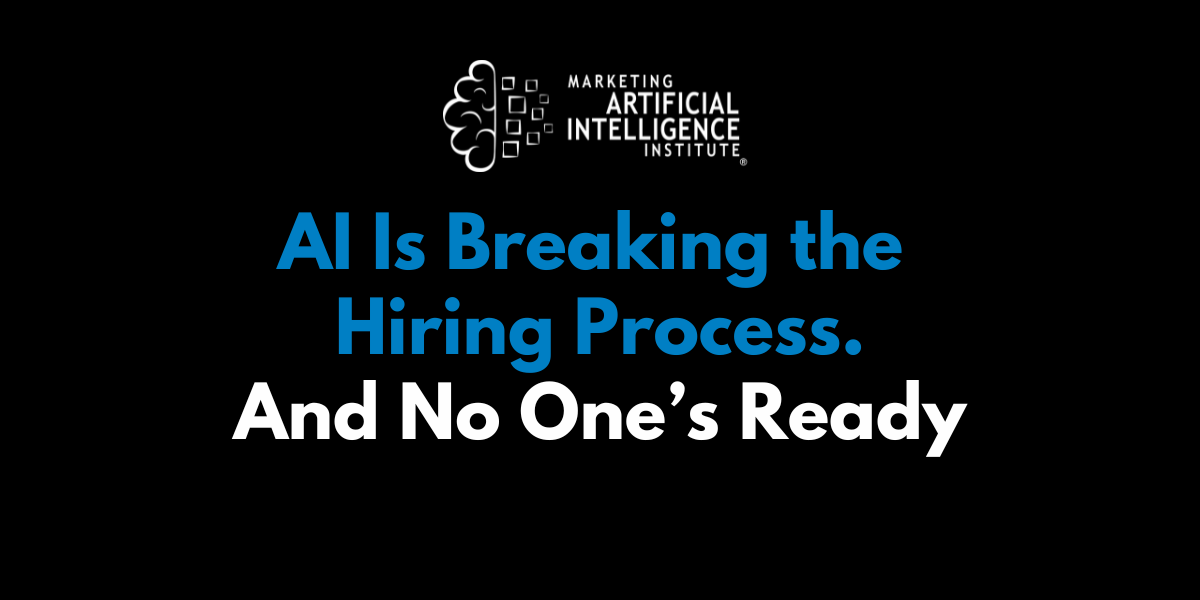Recruiters are facing an avalanche of job applications, partially thanks to AI.
According to a recent report in The New York Times, LinkedIn now sees over 11,000 job applications every minute, a 45% year-over-year surge. One big reason? AI-powered tools are flooding the system with resumes.
It’s not just ChatGPT cranking out tailored cover letters. Entire AI agents are now autonomously scouring job boards, applying en masse, and even completing screening questions.
The result: what some are calling an “applicant tsunami.” Recruiters are overwhelmed. Many resumes look eerily similar. Some candidates are fake. Others are using AI to cheat in interviews. And it’s all happening faster than anyone can keep up.
What does this mean for business leaders?
I got the scoop from Marketing AI Institute founder and CEO Paul Roetzer on Episode 157 of The Artificial Intelligence Show.
AI vs. AI: The New Hiring Reality
The report notes the following:
"With a simple prompt, ChatGPT, the chatbot developed by OpenAI, will insert every keyword from a job description into a résumé. Some candidates are going a step further, paying for A.I. agents that can autonomously find jobs and apply on their behalf. Recruiters say it’s getting harder to tell who is genuinely qualified or interested, and many of the résumés look suspiciously similar."
To fight back, companies are deploying their own AI.
That now includes automated interviews, game-based assessments. and bots like Chipotle’s Ava Cado, which screens and schedules applicants. But while these tools aim to streamline hiring, they’re not without risks.
Lawsuits over algorithmic bias are rising. The EU classifies AI hiring tools as “high risk” under its new AI Act. And HR professionals are now grappling with a deeper problem:
Verifying that any of this data is real.
"How do you verify the accuracy of all this?" asks Roetzer. "How do you think critically about these candidates? How do you have the confidence to say 'These are the five people I think we should move through the process'?"
A Generation Stuck in the AI Spiral
This isn’t just a tech problem. It’s a human one.
Derek Thompson, writing in The Atlantic and his Substack, paints a bleak picture of entry-level job seekers. His reporting reveals that students are now submitting 300, 500, even 1,000 applications per year.
AI makes this possible. New platforms like Handshake let them find hundreds of listings in minutes. ChatGPT and paid tools instantly tailor resumes.
Thompson calls it "a new story" that he didn’t expect to find:
AI isn’t destroying jobs, he says. It’s destroying the process of looking for jobs.
Imagine millions of grads each submitting hundreds of applications. That’s hundreds of millions of applications flooding the market every year. No HR team can process that. And even if they could, there’s no guarantee the information is genuine.
Writes Thompson:
"AI is automating homework, obliterating the meaning of much testing, disrupting the labor-market signal of college achievement and grades, distorting the job hunt by normalizing 500+ annual applications per person, turning first-round interviews into creepy surveillance experiences or straight-up conversations with robots, and, oh, after all that, maybe kinda beginning to saw off the bottom of the corporate ladder by automating some entry-level jobs during a period of economic uncertainty. This really is a hard time to be a young person."
Authenticity as the Endgame?
Some experts predict a return to authenticity. Career coach Jeremy Jeremy Schifeling is quoted by The Times as suggesting we might hit a breaking point where both candidates and recruiters crave more genuine interaction. But until then, it’s AI versus AI all the way down.
Schifeling says:
"As students get more desperate, they say, 'Well, I have no choice but to up the ante with these paid tools to automate everything.' And I’m sure the recruiters are going to raise the bar again."
In this spiraling arms race, authenticity might be the ultimate differentiator. But for now, that goal is buried under an unmanageable pile of bot-generated resumes and AI-assisted interviews.
"It's like AI is needed to deal with all the AI output from all of this," says Roetzer.
What Happens Next?
The job application process is now a high-speed battle between automation tools. But it’s not just efficiency on the line. It’s trust.
Who do you hire when everyone looks perfect on paper? Who do you trust when interviews may be AI-assisted performances? When the very metrics we use to gauge talent—GPA, resumes, even first-round interviews—are suspect, what’s left?
One VC-backed startup, Cluely, even brags about helping users cheat on everything. (And just raised another $15 million in a round led by Andreessen Horowitz.)
"This is the antithesis of what we should be striving for with AI," says Roetzer.
Mike Kaput
Mike Kaput is the Chief Content Officer at SmarterX and a leading voice on the application of AI in business. He is the co-author of Marketing Artificial Intelligence and co-host of The Artificial Intelligence Show podcast.


